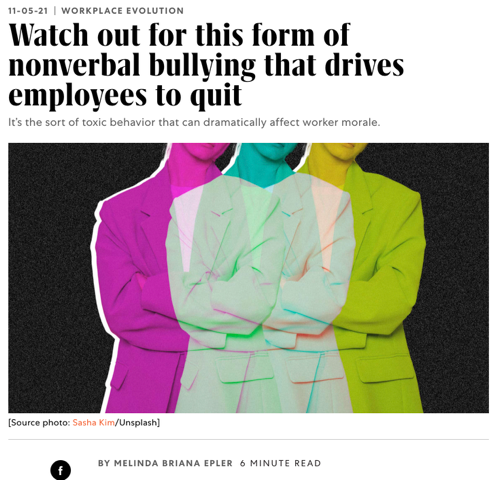Toxic behavior that affects morale and retention

I came across an article in Fast Company (LINK) by Melinda Briana Epler, the author of How to Be an Ally: Actions You Can Take for a Stronger, Happier, Workplace. Melinda makes many excellent points about microaggressions and non-verbal bullying. She writes about the impact these behaviors have on the individuals who are targeted, people who hear and see them, and on the workplace in general.
Epler writes that the key in responding to microaggressions is to “develop our empathy skills and become intentional so that we recognize the microaggression forming and stop it before it happens. Each individual microaggression can be harmful in the short-term, and as microaggressions accumulate daily, they can take a significant toll on someone’s life and career in the long term. People with underrepresented identities encounter microaggressions on top of the stress everyone has in work and outside of work, which is an unfair disadvantage in our work and in our lives.”
She continues, “as allies, it’s our job to understand what “microaggressions” are, and make sure we don’t do them. You may see some things here that you do or have done. At one time or another, all good allies find ourselves making a mistake. It’s our job as allies to listen, learn, unlearn, relearn, make mistakes, apologize, and keep learning. When we do our work as allies to reduce microaggressions, we often focus on verbal microaggressions. However, nonverbal microaggressions can be just as harmful.”
Epler writes about these main categories of nonverbal microaggressions:
- Facial expressions: Many microaggressions are nonverbal, so they can be subtle.
- Body language: A few key pieces of body language to keep in mind in avoiding microaggressions are closed body language and dominant power positioning. Become aware of how you might make people feel inadvertently, and change it if you can.
- Avoidance: when we fear saying or doing the wrong thing, we might avoid someone altogether. This avoidance can have long-term effects on someone’s life.
- Prime yourself
- Seek to become more self-aware in the moment
- Practice empathetic listening
I think Epler’s book is worth a read. She offers many small and big strategies and tips for how to be, as her title states, a better ally.

